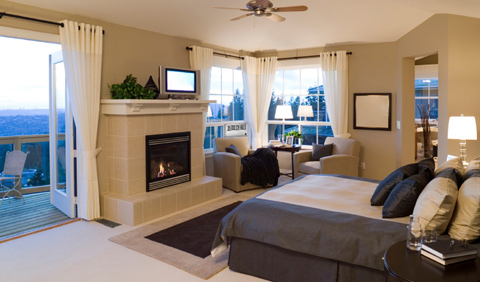By making a few small changes to both your bedroom and routine, you can not only save energy but also reduce your utility bills, resulting in a more comfortable and energy efficient environment.
Outlet
- Unplug any battery chargers or power adapters when not in use.
- Use inexpensive outlet gaskets to seal any holes around outlets.
Light Switches
- Always turn off the lights when leaving the bedroom (or when it’s not in use).
TV/DVD - Invest in electronics that are ENERGY STAR certified.
- ENERGY STAR certified products use less energy without sacrificing quality or performance.
- Learn more:
- Consumer electronics account for 15% of household electricity usage.
- Many electronic products continue to use energy even when switched off.
- ENERGY STAR certified products conserve energy when switched off while still maintaining clock displays, channel settings and remote control functions..
Bedside Lamps
- Replace light bulbs and fixtures with ENERGY STAR certified products.
- Learn more:
- Save up to $70 in annual energy costs by replacing your 5 most frequently used light bulbs or fixtures with ENERGY STAR certified ones.
- ENERGY STAR certified compact fluorescent light bulbs (CFLs) provide a high quality light, use less energy and last up to 10 times longer than standard incandescent light bulbs.
- Choose from a wide range of attractive and stylish ENERGY STAR certified lamps and light fixtures.
Air Conditioner
- ENERGY STAR certified air conditioners often include timers, allowing for better temperature control.
- Conserve energy and save costs with an ENERGY STAR certified air conditioner, which uses a minimum amount of energy to cool your bedroom.
- Learn more:
- Make sure window-fitted A/C units fit snugly in the window frame, to prevent outside air from getting in.
- Large window A/C units should be equipped with their own separate electrical circuits to avoid system overloads.
- WINTER TIP: insulate A/C unit with a tight fitting unit cover (available from local hardware stores) that prevents heated air from escaping outside.
- WINTER TIP: remove window A/C unit during winter months to prevent energy loss.
- Ensure the A/C unit is the right size for the bedroom.
Window
- Caulk and weather-strip areas around doors and windows to prevent air leakage.
- Replace window screens with storm windows during winter as an extra barrier against cold air.
- Learn more:
- ENERGY STAR certified windows can save you anywhere from $150-$500 annually in energy costs.
- Cut drafts, increase home comfort and help preserve interior furnishings with properly installed ENERGY STAR certified windows.
Air Register
- Ensure vent connections and registers are well sealed at floors, walls and ceilings, which are all common areas for disconnected ducts and leakage.
- Make sure all vents are clear of furniture and rugs in order to improve airflow and comfort.
- Install heat resistant reflectors between radiators and walls to reflect heat back into the room instead of onto walls.
Fireplace
- Close the flue damper when not in use to prevent air escaping from the house.
- Learn more:
- A chimney, by design, removes by-products from a fire by creating a draft, which also pulls away air (warm or cool) from your home.
- As long as there’s a temperature difference between indoors and out, there will be a chimney draft even if there’s no fire in the fireplace.
- By keeping the damper closed, air-conditioned or warmed air remains in the living space where it belongs.
- Use a direct vent or sealed combustion gas log unit.
Ceiling Fan With Lighting
- Depending on how they’re used, ceiling fans can help reduce energy costs while providing home comfort.
- Learn more:
- WINTER TIP: most ceiling fans have a switch allowing you to rotate the blades in reverse, creating a gentle updraft forcing warm air near the ceiling down into the living area.
- In the summer, make sure your ceiling fan is blowing air downwards into the living area.
- On hot days, turn up the thermostat by two degrees and use your ceiling fan to lower air conditioning costs by up to 14%.
- Use low wattage compact fluorescent light bulbs (CFLs) in the ceiling light fixture for cooler light bulbs and greater energy savings.
- Turn off the ceiling fan when you leave the room; fans only cool people, not rooms.

